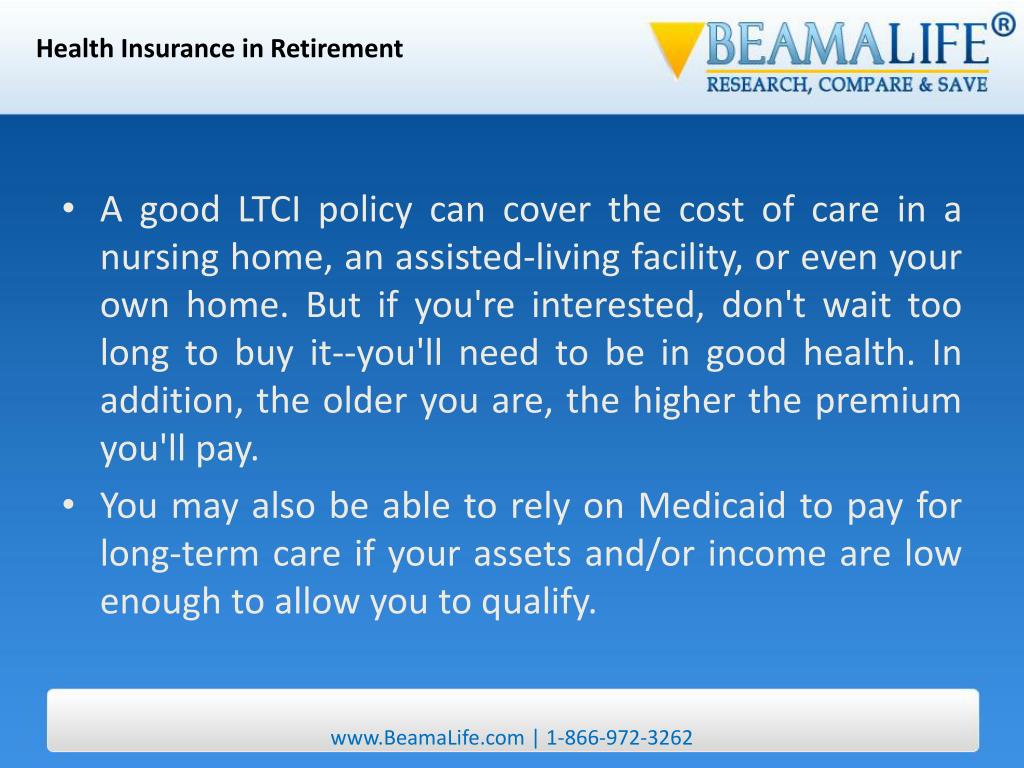Health Insurance for Retirees: What You Need to Know-www.waukeshahealthinsurance.com-www.waukeshahealthinsurance.com
However, the financial realities of healthcare costs can significantly impact this idyllic vision. Understanding health insurance options during retirement is crucial to ensuring a comfortable and secure future. This article will explore the intricacies of health insurance for retirees, providing a comprehensive guide to navigate this often-complex landscape.

The Shifting Landscape of Retirement Healthcare
The cost of healthcare continues to rise, making it a major concern for retirees. Unlike their working years, when employer-sponsored health insurance often provided a safety net, retirees must navigate the complexities of Medicare, supplemental plans (Medigap), and potentially, private insurance options. The lack of a consistent, employer-provided safety net necessitates careful planning and a thorough understanding of available resources.
Medicare: The Foundation of Retirement Healthcare
Medicare is a federal health insurance program primarily for people age 65 or older and certain younger people with disabilities. It’s a crucial component of retirement healthcare planning, but it’s not a complete solution. Medicare is comprised of four parts:
Part A (Hospital Insurance): Covers inpatient hospital care, skilled nursing facility care, hospice care, and some home healthcare. Most people don’t pay a premium for Part A because they or their spouse paid Medicare taxes while working.
Part B (Medical Insurance): Covers doctor visits, outpatient care, medical supplies, and preventive services. Part B has a monthly premium, and the cost varies depending on income.

Part C (Medicare Advantage): Offered by private companies approved by Medicare, Part C combines Part A, Part B, and usually Part D. It often includes extra benefits like vision, hearing, and dental coverage, but the coverage details and costs vary widely by plan.

Part D (Prescription Drug Insurance): Covers prescription medications. Part D is administered by private insurance companies and has monthly premiums and deductibles.
Understanding the nuances of each part is vital. While Medicare provides a significant benefit, it doesn’t cover everything. There are gaps in coverage, leading many retirees to seek supplemental insurance. For more information on navigating the intricacies of Medicare, consider consulting a specialist or visiting a reputable insurance provider like www.waukeshahealthinsurance.com.
Medigap: Filling the Gaps in Medicare Coverage

Medigap, also known as Medicare Supplement Insurance, is private insurance designed to fill the gaps in Original Medicare (Parts A and B) coverage. These plans help pay for costs that Medicare doesn’t cover, such as copayments, deductibles, and coinsurance. There are various Medigap plans (A through N), each offering different levels of coverage. Choosing the right Medigap plan depends on individual needs and budget. It’s crucial to carefully compare plans and understand their benefits and limitations before enrolling. www.waukeshahealthinsurance.com can assist you in finding a Medigap plan that best suits your circumstances.
Medicare Advantage (Part C): An Alternative Approach
Medicare Advantage plans are offered by private companies and are an alternative to Original Medicare. These plans typically include Part A, Part B, and often Part D coverage. They often offer additional benefits like vision, hearing, and dental coverage, which are not included in Original Medicare. However, Medicare Advantage plans have networks of providers, meaning you generally need to see doctors and specialists within the plan’s network. The cost and coverage vary significantly between plans, so careful comparison is essential. A consultation with an insurance professional, such as those at www.waukeshahealthinsurance.com, can help you understand the intricacies of Medicare Advantage and determine if it’s the right choice for you.
Private Health Insurance: A Supplemental Option
For retirees who need additional coverage beyond Medicare and Medigap, private health insurance can be a valuable supplement. This can be particularly relevant for those with pre-existing conditions or those seeking more comprehensive coverage than Medicare provides. Private insurance plans offer varying levels of coverage and cost, and choosing the right plan requires careful consideration of individual needs and financial capabilities. www.waukeshahealthinsurance.com offers expertise in helping retirees navigate the options available in private health insurance.
Factors to Consider When Choosing Retirement Health Insurance
Selecting the right health insurance plan during retirement requires careful consideration of several factors:
Budget: Healthcare costs can be substantial, so understanding your budget and the cost of different plans is crucial. Consider the monthly premiums, deductibles, copayments, and out-of-pocket maximums.
Health Status: Your current health condition and anticipated healthcare needs will influence your choice of plan. If you have pre-existing conditions, you’ll need a plan that adequately covers those conditions.
Lifestyle: Consider your lifestyle and healthcare usage patterns. Do you frequently visit the doctor? Do you require specialized care? These factors will influence your need for comprehensive coverage.
Provider Network: If you have a preferred doctor or specialist, ensure that they are included in the plan’s network. Out-of-network costs can be significantly higher.
Prescription Drug Coverage: If you take prescription medications, carefully review the formulary (list of covered drugs) and the cost-sharing for those medications.
The Importance of Professional Guidance
Navigating the complexities of retirement health insurance can be overwhelming. Seeking professional guidance from an experienced insurance agent can make a significant difference. A qualified agent can help you understand your options, compare plans, and choose the best plan for your individual needs and budget. www.waukeshahealthinsurance.com provides expert advice and personalized assistance to help retirees make informed decisions about their health insurance.
Planning Ahead: A Proactive Approach
Planning for retirement healthcare is not something to be left until the last minute. Starting early allows you to understand your options, compare plans, and make informed decisions. This proactive approach can significantly reduce stress and ensure you have the coverage you need during your retirement years. Regularly reviewing your coverage as your needs and circumstances change is also essential.
Conclusion: Securing a Healthy and Secure Retirement
Retirement should be a time of joy and fulfillment. By understanding the complexities of health insurance and planning ahead, you can significantly reduce the financial burden of healthcare costs and ensure a healthy and secure retirement. Don’t hesitate to seek professional guidance from experienced insurance professionals to help you navigate this important aspect of retirement planning. www.waukeshahealthinsurance.com is a valuable resource for retirees seeking comprehensive and personalized assistance in finding the right health insurance plan. Take the time to research, compare, and choose a plan that provides the coverage you need and fits within your budget, ensuring a worry-free and enjoyable retirement.
